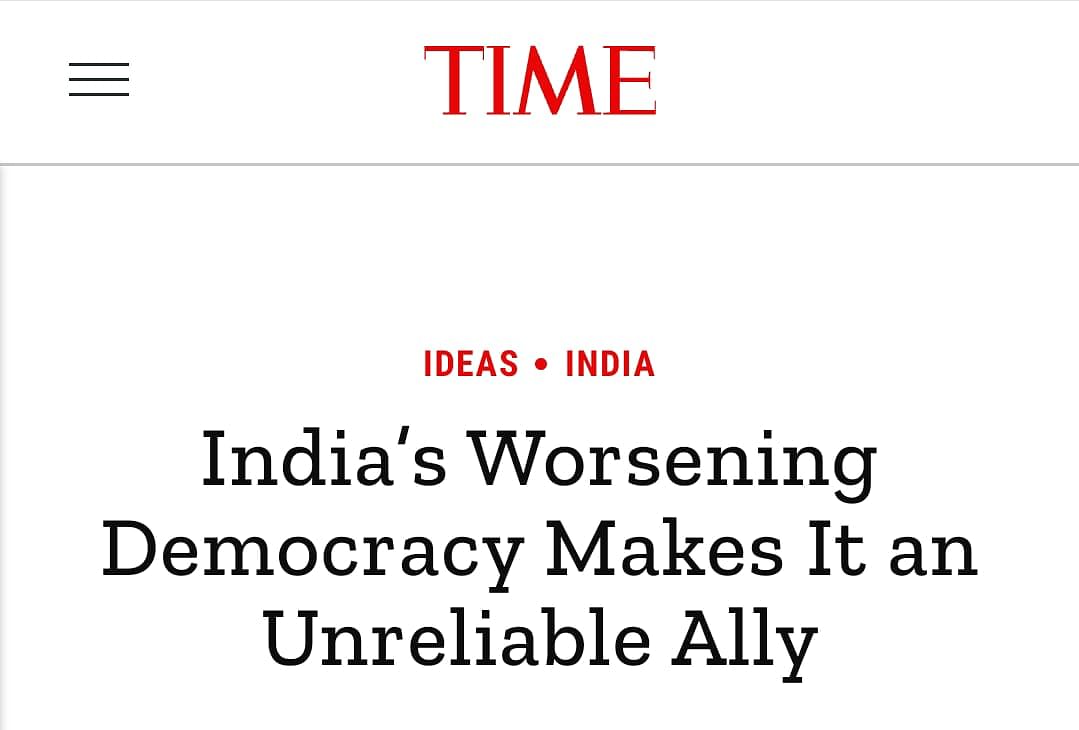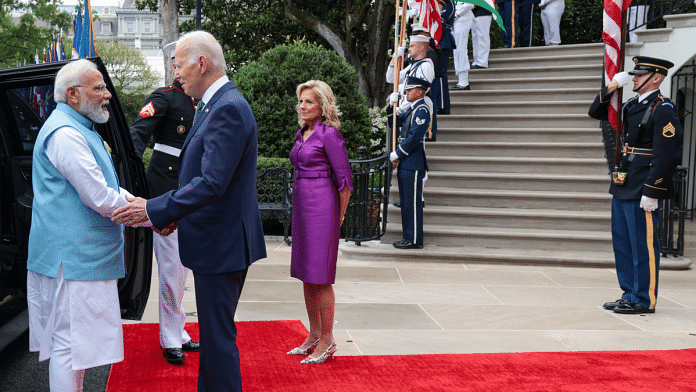New Delhi: Amid Prime Minister Narendra Modi’s ongoing official state visit to the US, the American media seems to have struck a balance with reports claiming that the Hindu nationalist government poses significant threats to India’s democracy and conceding to the need for allyship vis-a-vis China’s rising economic and military dominances.
Modi is only the third foreign dignitary — after France’s President Emmanuel Macron and South Korea’s President Yoon Suk Yeol — to be invited by US President Joe Biden for a state dinner since January 2021, ostensibly demonstrating the growing ties between the two nations.
Prominent media houses such as The Washington Post, The New York Times and The Economist noted that the US earlier denying a visa for his alleged role in the 2002 Gujarat riots to rolling out the red carpet in Washington, highlights Modi’s “change in fortune and growing global clout, even as concerns about human rights and democratic erosion in India are intensifying across the nation he now leads.’
In its editorial titled ‘The India Quandary’, The New York Times noted that it is also ‘critical to make clear that intolerance and repression run counter to everything that Americans admire in India, and threaten the partnership with the United States that its president is actively seeking to strengthen and deepen’ and make it known ‘how dangerous his autocratic leanings are, to the people of India and for the health of democracy in the world’.

Meanwhile, Fox News, the most popular American conservative media outlet stated that Biden will “court” India, which has “grown cooler” under the Modi administration and added that ‘India and the US shared a rosier dynamic during the Trump administration’.
‘From banned to embraced by the US’
In its analysis, CNN noted that the White House’s welcome to the Indian PM is ‘a clear indication of how much of a strategic partner Modi has become’ as a ‘critical regional partner’ since ‘shared concerns over China is key priority.’

In another report, CNN noted that ‘Modi and India, the world’s largest democracy, also represent a lynchpin in Biden’s strategy in Asia’ and called it the rationale behind the White House invitation to Modi for a state visit.
Along similar lines, Vox Media’s piece highlighted that even amid a ‘pseudo-fascist assault on democracy in the world’s largest country’, criticism is muted ‘perhaps because of India’s geopolitical significance’ as ‘Washington and its Pacific allies court New Delhi in their effort to balance a rising China’.
Beijing’s expanding military power, economic influence, and aggressive territorial claims present a challenge for the United States. The Washington Post reported on US Secretary of State Antony Blinken’s ‘tense trip’ to China, and President Biden referred to China’s Xi Jinping as a “dictator” before Modi’s visit. The two countries’ militaries have cut off communication due to the deteriorating trading relationship.
According to an article in The New York Times, the US is “forced” to accept the faults of its friends in this situation.
In an analysis piece, it minced no words in calling out Biden’s strategic outreach to India which it sees as ‘ one of the bulwarks against an advancing China.’ Calling it a ‘temporary truce’, it further noted: ‘Two and a half years into his administration, the democracy-versus-autocracy framework has, therefore, become something of a geopolitical straitjacket for Mr. Biden’.
Also Read: From unusual state dinner with Obama to ‘Howdy, Modi!’ — a look at Modi’s past 7 US visits
‘Vanishingly rare press conference’ by ‘unreliable ally’
As Modi answered two live questions from journalists in Washington on Thursday, The New York Times called it a “vanishingly rare” press encounter. It further stated that Modi has avoided any exposure to unscripted situations. During the press conference, in response to a question from a WSJ journalist about human rights and free speech in India, Modi stated that “democracy runs in our veins” and that there is “absolutely no space for discrimination.”
Noting the increasing attack on press freedom in India, the Associated Press termed his conference as ‘a rare occurrence for the Indian prime minister who avoids unscripted moments and has presided over a steady decline in press freedom in his country’.
On Thursday, India and the US unveiled a number of defence and commercial deals. These include the Biden administration’s pledge to make H1B visa renewal easier for Indians and the establishment of more consulates, Micron Technology’s $825 million investment in a chip assembly unit in Gujarat, India’s inclusion in the Minerals Security Partnership, solar panel maker Vikram Solar’s $1.5 billion investment in the US, a joint mission with NASA, and, most importantly, India’s procurement of 31 armed MQ-9B SeaGuardian drones.

Calling India an ‘unreliable ally’, Time noted that while the ‘hyper-nationalist Indian media sees American eagerness’ of Modi’s welcome as a ‘sign of India’s arrival on the international stage’, it noted India has ‘always been a flawed democracy’ where human rights records have worsened’. It further noted that the US is helping Modi ‘script his re-election campaign’ through ‘excellent visual footage’.
Obama drops bomb
What soon became a talking point across the media was former US president Barack Obama’s interview with CNN chief international anchor Christiane Amanpour, the excerpts of which were broadcast just hours before Modi’s visit Thursday to the White House.
In the interview titled ‘Obama and Amanpour: Will Democracy Win’ , the former US president said a firm ‘no’ to a query on whether India was a democracy. Obama admitted that he collaborated with Modi on climate warming and other issues. He stated that addressing concerns about Indian democracy must be included in diplomatic discussions.
“Look, it’s complicated,” Obama said. “The president of the United States has a lot of equities. And when I was president, I would deal with figures in some cases who were allies, who, you know, if you pressed me in private, do they run their governments and their political parties in ways that I would say are ideally democratic? I’d have to say no.”
“Part of my argument would be that if you do not protect the rights of ethnic minorities in India, then there is a strong possibility India at some point starts pulling apart. And we’ve seen what happens when you start getting into those kinds of large internal conflicts,” he added.
(Edited by Tony Rai)
Also Read: From jet engines to drones, space and 6G – Big takeaways from PM Modi’s US visit



